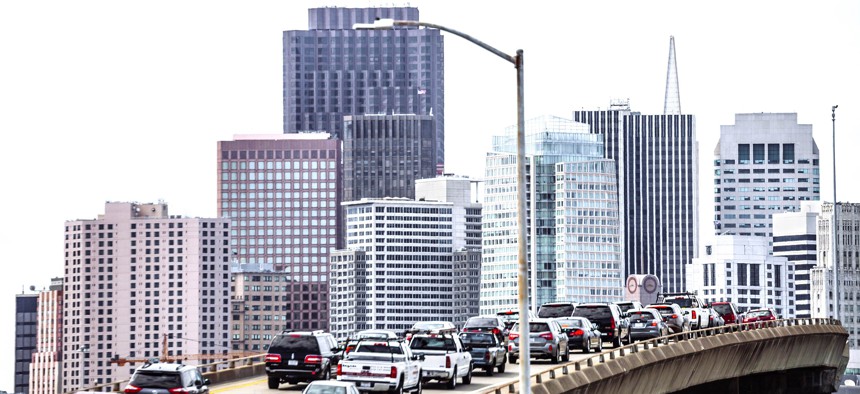In One City, 3 Days a Week in the Office May be a New Norm

Traffic in San Francisco. iStock.com/peeterv
That's according to a survey of about 200 companies in the San Francisco region. City leaders in other parts of the country are waiting to see how similar trends play out.
Many companies in the San Francisco Bay Area expect that their workers will not be returning to the office five days a week, even once the pandemic has fully subsided, according to a new poll.
The survey of 205 employers, conducted by the Bay Area Council in mid-July, found 40% anticipate employees will return to physical workplaces just three days a week post-pandemic. Twenty-two percent said two days per week, 13% four days, and 19% five or more days.
That's a sharp contrast to before the pandemic when about 70% of respondents said their typical employee came into workplaces five days or more each week.
If the survey findings hold true, the shift could have implications for office space, transit systems, traffic congestion and shops and restaurants that depend on commuters for business. While the survey was specific to the San Francisco area, which is heavy with desk jobs in the tech sector, city leaders in other parts of the country are waiting to see how these trends will play out in their regions.
“We’re seeing a potentially tectonic shift in the region’s commute patterns,” said Jim Wunderman, president and CEO of the Bay Area Council, a business and civic leadership group.
“This could be good or bad news depending on how workers eventually choose to return to their commutes," he added in a statement. "As we move past Covid, it will be critical to do everything we can to get commuters back onto transit."
The council's summary of the survey says the results indicate that commuter trips could drop by an average of 1.1 million per day to places of employment once the pandemic is over. But it also notes that many Bay Area employees who have begun returning to offices are driving in, and that transit ridership remains down.
Kelly Obranowicz, policy and regulatory counsel for the Bay Area Council, noted in a statement that traffic congestion is hitting pre-pandemic levels on many days.
Potential traffic reduction gains from increased remote work could be wiped out if workers choose to commute by single occupancy vehicles in higher numbers than pre-pandemic, she added.
The full survey results can be found here.
Related story previously published on Route Fifty:
Bill Lucia is a senior editor for Route Fifty and is based in Olympia, Washington.
NEXT STORY: One State to Spend $130M in Federal Funds to Tackle ‘Systemic Barriers’ to Employment






